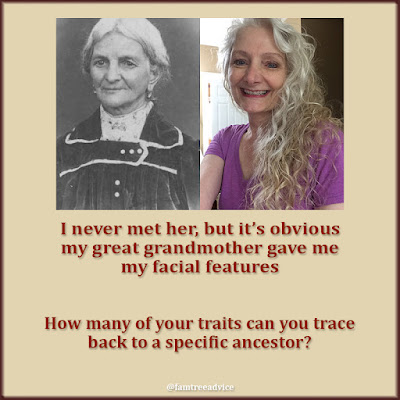Can you inherit your bright-eyed optimism from your ancestors? Popular shows like "Finding Your Roots" and "Who Do You Think You Are?" tell stories about celebrities learning their ancestor shared their personality traits. But are you really a musician because your 3rd great grandfather was?
Science says you can inherit a personality trait *if* there's a physical component to it. You can inherit perfect pitch because it's a physical trait—a physical ability. You can inherit your optimism because it's tied to the oxytocin receptors in your brain.
 |
| You may be familiar with how DNA works, but have you examined which traits and features you inherited from whom? |
You can also inherit traits you saw your family members modelling. I tend to react to another driver cutting me off in exactly the same way as my father. I think that's more about watching him drive than inheriting a gene. But you didn't see your 3rd great grandfather modelling his musical skills.
The Science of Inheritance
I remember learning about trait inheritance in 9th grade biology class. We all have 2 genes for each physical trait, and we pass only one to each child. If dad's genes carry both the dominant brown-eyed trait and the recessive blue-eyed trait, and mom's genes carry only the recessive blue-eyed trait, what are the chances they'll have a blue-eyed child? Do the math to see there's a 50% chance.
Let's take my blue-eyed Mom as an example. Her mother had brown eyes and her father had blue eyes. But she and her 2 siblings did not get brown eyes. That means Grandma passed down the recessive gene she inherited from her blue-eyed father.
It would be nice to think that my entrepreneurial son Chris inherited his skills from his 2nd great grandfather, Giovanni. Giovanni came to America without any type of skilled trade. But somehow, he quickly became the owner of a building with 4 apartments and retail space.
 |
| This equation shows how slim the chances were for my sons to be anything but blonde-haired and blue-eyed. |
In reality, Chris probably observed his father's attempts to be an entrepreneur, and my years of working as a successful independent contractor. Chris was always determined to never work for someone else. And he's stubborn enough to make it a reality.
My other son, Joe, has long been my clone. He has a strong gene for laziness that I don't have, but he's smart enough to overcome it. He prefers to work alone without asking for help, which is something my father and I share. Many times I see Joe expressing exactly my thoughts on a range of topics. I tend to think that's from his upbringing.
Inheritance in Your Family Tree
Here's an exercise that can be a fun way to raise your family's interest in genealogy. Certain physical traits are dominant while others are recessive, like the brown eyes and blue eyes mentioned above. How many of your family members inherited recessive genes? Who do you think those genes came from?
| Trait | Dominant | Recessive |
| Earlobes | Unattached | Attached |
| Tongue rolling | Can do it | Can't do it |
| Dimples | Have them | Don't have them |
| Handedness | Right-handed | Left-handed |
| Hair | Curly | Straight |
| Freckles | Have them | Don't have them |
| Toe length | 2nd toe longest | Big toe longest |
| Nose width | Broad | Narrow |
| Lip width | Broad | Thin |
| Eyelashes | Long | Short |
In my case, I inherited a lot of recessive genes and one big dominant one for my curly hair. I don't know which ancestor gave me my left-handedness, but not long ago people discouraged that trait. Ringo Starr's grandmother forced him to act like he was right-handed, but he isn't. He says that's why his style of drumming is so unique. He's playing backwards!
Where do you think your physical traits came from? How about your personality traits?
Want to learn more? See:
The Blue-eye Brown-eye inheritance is not this simple. I took a genetics class with a lab at Penn State in the 1970s. Back then, it WAS believed that there were 2 genes for eye color, and 2 blues = blue, 2 browns = brown, and 1 brown 1 blue = brown, etc. This is not correct. It was discovered some time ago that there are more than just 2 genes for eye color, AND that eye color is merely how many layers of pigment are in/on your eye. My very good friend and her husband both have blue eyes, and they have a child with brown eyes. The baby was born back in the 1980s when I/everyone still believed that two blue-eyed people couldn't have a brown-eyed child. But that child inherited more than one gene from each parent, and subsequently had more pigment layers than either parent.
ReplyDeleteVery interesting!
ReplyDelete